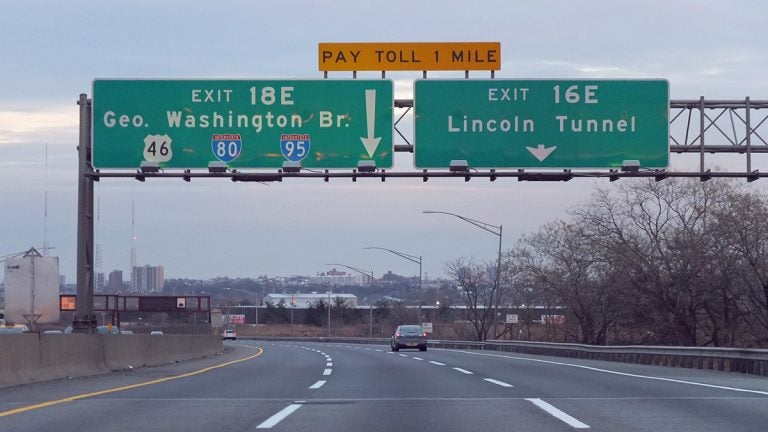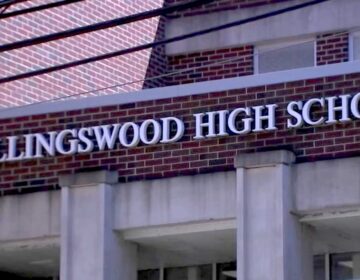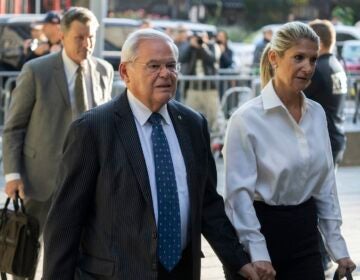Embattled NY/NJ Port Authority still fighting toll hike lawsuit

A lawsuit alleges the NY/NJ Port Authority is illegally diverting toll money to pay for cost overruns on the WTC. (Alan Tu/WHYY)
While political attention remains riveted on the Bridge-gate scandal that forced the resignation of Gov. Christie’s top two lieutenants at the Port Authority, the bistate agency remains embroiled in a lawsuit challenging the legality of its massive multiyear toll hike. At the heart of the suit is the allegation that toll revenue is being illegally diverted from transportation projects to pay for billions of dollars in cost overruns on the World Trade Center project.
For two years, the Port Authority has been battling to block the release of documents showing its internal deliberations leading up to its controversial September 2011 decision — jammed through after just one day of hearings — to raise tolls on the Lincoln and Holland Tunnels; George Washington, Bayonne and Goethals bridges; and the Outerbridge Crossing from $8 to $15 by 2015 (rate sched).
“We’ve been fighting for this information for two years, and we’re still in the discovery phase,” said a frustrated Marta Genovese, AAA New York’s vice president and in-house counsel. Genovese is handling the lawsuit for AAA’s New York and North Jersey chapters in U.S. Magistrate’s Court for the Southern District of New York. “The court ordered the release of the documents in August, but we’re still waiting. We filed another motion last month,” she said.
Genovese said the Port Authority is invoking “attorney-client privilege” to block the disclosure of internal communications with its “clients,” Christie and New York Gov. Andrew Cuomo. It’s also claiming that predecision memos and emails among high-ranking Port Authority officials are protected by the “deliberative process privilege” — better-known as “executive privilege” when invoked by American presidents.
“The Port Authority is a public agency, but it doesn’t feel it has to answer to the public,” Genovese said.
Critics and Cost Overruns
To the Port Authority’s growing army of critics the AAA lawsuit is important not only as an example of the Port Authority’s lack of transparency, but also because it highlights the difficulty of assessing the fiscal health of the agency in the wake of disclosures that the World Trade Center project is running $4 billion over budget. This assessment is further complicated by the agency’s continued failure to adopt a new capital plan.
“The AAA lawsuit is just another example of the delaying tactic that the Port Authority has been using successfully to block to release of important information,” said Jameson W. Doig, the Princeton University professor whose Empire on the Hudson is the definitive history of the authority. “But it goes beyond that. It is important for the general public and the bondholders to have a real understanding of the financial situation at the agency.”
“There is no question that the Port Authority’s fiscal problems with the World Trade Center have been a source of delay on some important projects, including the LaGuardia Airport modernization and the helix project at the Lincoln Tunnel,” he said. “But if there is no capital plan, how can we judge whether there’s a real financial problem or not?”
The Port Authority cited the $11 billion cost of rebuilding the World Trade Center as a major fiscal liability in its 2011 press release announcing its decision to seek a toll increase from $8 to $15 on its six bridges and tunnels. Based on that statement, Genovese said, the AAA expected to win a summary judgment on its lawsuit contending that the Port Authority was illegally diverting toll revenues to non-transportation purposes.
But the Port Authority backed off that tack in its response to the AAA lawsuit, insisting that no toll money would be going to the World Trade Center project. The authority asserted that its interstate transportation network, which includes the money-losing Port Authority Trans-Hudson (PATH) rail line, operates at an overall deficit, even with all toll revenue from the six bridges and tunnels included, and therefore no toll money is being diverted to the World Trade Center.
However, that was before Port Authority officials acknowledged that the cost of the World Trade Center project had ballooned from $11 billion to $15 billion — a massive increase considering that Christie cancelled the Access to the Region’s Core (ARC) rail passenger tunnel project in 2010 because he feared that cost overruns could hit $3 billion.
U.S. Magistrate Judge Richard Holwell declined to issue an injunction blocking the toll hikes in February 2012, but allowed AAA to proceed with its lawsuit. That was 23 months ago; the lawsuit is still bogged down in discovery motions; and Holwell himself has retired, passing the case on to U.S. Magistrate Judge Henry Pitman and to Judge Richard K. Eaton of the United States Court of International Trade
Port Authority officials did not respond to requests for comment over the weekend concerning the lawsuit, its capital plan, and the impact of the substantial World Trade Center cost overruns.
“That $4 billion cost overrun is going to have to be paid for somehow,” said Martin Robins, director emeritus of Rutgers University’s Alan M. Voorhees Transportation Policy Center. “The Port Authority is now saying that the World Trade Center will be paid for out of bonded indebtedness, but that restricts the amount of transportation capital projects that can be done out of debt in the future. It means a smaller capital program on the transportation side.”
Christie diverted $1.8 billion of the $3 billion the Port Authority originally set aside for the ARC Tunnel to provide some of the matching funds he needed to underwrite a five-year $8 billion Transportation Trust Fund plan without raising gas taxes in 2011.
But it is unclear where the other $1.2 billion originally set aside for the tunnel will be going, Robins said, and it is unclear that the Port Authority will have the resources to serve as a matching-fund piggybank again in 2016 when the Transportation Trust Fund again comes up for renewal. Compounding the Port Authority’s fiscal headache in the short term is the fact that toll revenue from its bridges and tunnels has failed to meet expectations in the wake of the toll hikes, Robins said.
The Need for a Capital Plan
Robins agreed with Doig that it is virtually impossible to project the Port Authority’s ability to meet the bistate region’s future transportation needs without a capital plan.
Carol Kellermann, president of Citizens Budget Commission, a New York City-based watchdog group that made a series of recommendations last July to improve the Port Authority’s fiscal-reporting practices, noted that the agency said at the time that its “soon-to-be-released capital budget” would lay out the agency’s long-term strategy and vision.
Six months later, Kellermann said, “There’s still no capital plan. Nothing. Zero. They’re still approving capital projects on a piecemeal basis.” Kellermann said she was flabbergasted by the Port Authority’s decision, at Christie’s request, to take over the operation of Atlantic City’s airport, which is located far south of the Port region, defined as within a 25-mile radius of lower Manhattan. “What can I say?” she asked rhetorically.
Genovese noted that the Port Authority referenced a long-range $25.1 billion capital plan almost two-and-a-half years ago in its August 2011 press release announcing its plan to seek a major toll increase, then said no capital plan existed.
It was not until four months later — after approval of the five-year phased-in toll hike by Christie and Cuomo — that the Port Authority adopted a capital plan for 2012.
That was more than two years ago, however. Following the disclosure of the World Trade Center cost overruns, the Port Authority adopted an operating budget, but no capital budget, for 2013 at its December 2012 board meeting. Last month, for the second year in a row, the Port Authority again failed to adopt a capital budget, Kellermann pointed out.
“The Port Authority’s capital plan is a tradeoff between what New York gets and what New Jersey gets, and there seems to be a lot of internal jockeying going on,” Kellermann said. “The nature of the power struggle between the two states seems to be particularly acute now, and the failure to adopt a capital plan is just the most obvious symptom.”
The delay in the release and adoption of a new Port Authority capital plan — which one source suggested would be done in the near future — is not surprising in the wake of the Bridge-gate scandal that has engulfed the agency and its top officials over the past several months.
David Wildstein, the high school friend whom Christie appointed as the Port Authority’s director of interstate transit projects, has been subpoenaed by Assembly Transportation Committee Chairman John Wisniewski (D-Middlesex) to testify under oath in Trenton Thursday on his controversial decision to close two lanes leading into the George Washington Bridge from Fort Lee.
Wildstein’s decision, which he ordered kept secret both from Port Authority Executive Director Patrick Foye and Fort Lee’s mayor and police officials, snarled traffic in Fort Lee for four days in September. Wisniewski, Senate Majority Leader Loretta Weinberg (D-Bergen), and other officials have suggested that the closure was political retaliation against Fort Lee Democratic Mayor Mark Sokolich for refusing to endorse Christie for reelection.
Sokolich and other Fort Lee officials repeatedly complained to Port Authority officials, including Bill Baroni, the Port Authority deputy executive director appointed by Christie, but it was not until Foye, a Cuomo appointee, finally heard about the closures that the lanes were reopened. The lane closures hampered Fort Lee police and emergency personnel, and Foye suggested that the closures may have constituted a criminal action.
Wildstein and Baroni, who served as Christie’s “eyes and ears” at the increasingly politicized Port Authority, resigned a week apart in December.
Christie said they were planning to resign away, but the governor’s repeated efforts to joke about the issue and dismiss the controversy as a partisan attack by Democrats on an “inconsequential” matter involving “the moving of a few cones” have failed to quell the furor.
With Christie serving as chairman of the Republican Governors Association and consistently leading the polls for the 2016 Republican presidential nomination, the Democratic National Committee, liberal pundits, and newspapers running the gamut from The New York Times to The Wall Street Journal have cited the Bridge-gate scandal as evidence that Christie is a political bully who retaliates against those who cross him.
That’s why Wildstein’s testimony Thursday will draw national attention.
“When not making traffic cone jokes and shrugging off the threats to public safety these lane closings created, Gov. Christie has made clear that this decision was largely the fault of Mr. Wildstein,” Wisniewski said in issuing the subpoena to Wildstein on New Year’s Eve. “So as we continue gathering information on this matter the time has come to hear directly from Mr. Wildstein.”
“The public deserves answers as to how this decision was made, who was involved, and its true purpose,” said Wisniewski, who has suggested publicly that the directive to Wildstein to close the lanes may have come from outside the Port Authority. “I look forward to Mr. Wildstein providing insight into this decision that put public safety at risk and raised serious questions about this vital yet dysfunctional agency being used for political vengeance.”
__________________________________________________________
NJ Spotlight, an independent online news service on issues critical to New Jersey, makes its in-depth reporting available to NewsWorks.
WHYY is your source for fact-based, in-depth journalism and information. As a nonprofit organization, we rely on financial support from readers like you. Please give today.




